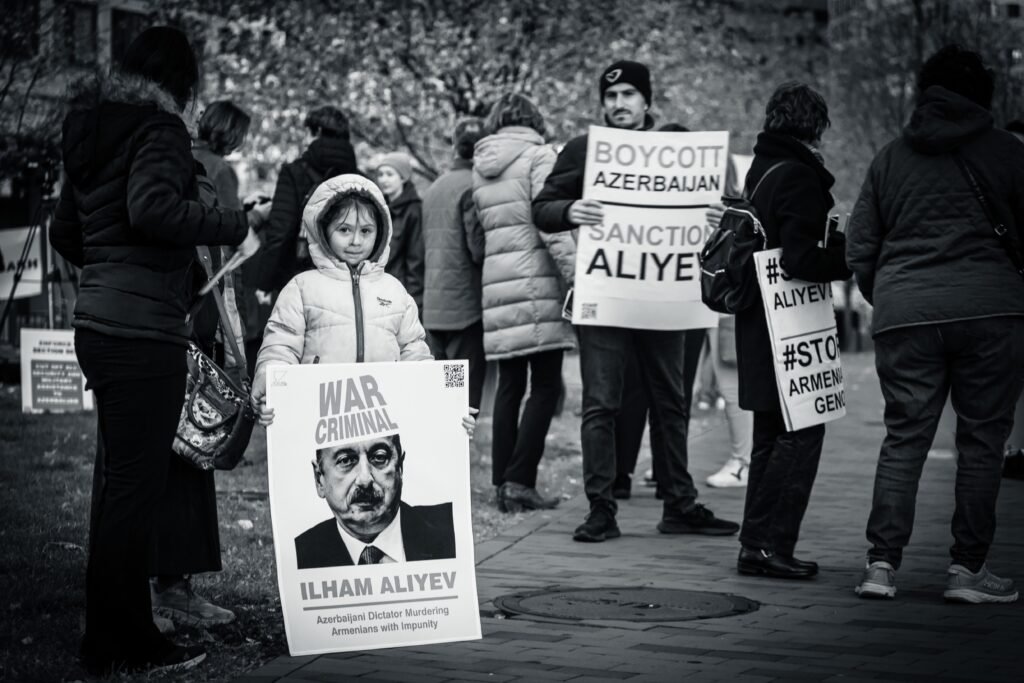
BOSTON—On the frigid afternoon of November 18, 2023, Zoravik Activist Collective concluded its protest series in support of Artsakh by hosting a “Rally to Demand US Action for Artsakh” in front of the JFK Federal Building in Boston. In solidarity with 14 organizations in the greater Boston community, the rally’s 16 speakers shed light on the ethnic cleansing of over 100,000 Armenians from Artsakh by Azerbaijan in September 2023 after a 44-day war in 2020 and a brutal nine-month blockade in 2023 that deprived the population of food, medical supplies and fuel.
Activist singer-songwriters Sami Martasian (of Puppy Problems) and Chris Kazarian performed before and during the rally. Martasian’s songs about gentrification and Kazarian’s song titled “When Will We Get To Live?” were musical explorations of inequality and injustice that echoed the themes of the rally mentioned by many of its speakers.
The speakers at the rally expressed outrage over the international community’s failure to protect Armenians in Artsakh, demanded that the U.S. cut military and other aid to Azerbaijan, highlighted the urgent need for humanitarian assistance for forcibly displaced Armenians of Artsakh, urged American lawmakers to support Armenian democracy and sovereignty, noted the strength of aligning with other oppressed populations and encouraged the community to do more together.
The organizers had compiled a list of statements, trusted news articles, videos and other links about Artsakh into the following website: www.ArtsakhSOS.com. This online resource was disseminated to passers-by via postcards and through QR codes on protest signs.
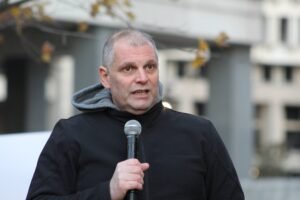
Several speakers noted their outrage about the international community’s failure to protect Armenians in Artsakh from Azerbaijani aggression. Reading Zoravik’s prepared statement, Dr. Lisa Gulesserian listed numerous times when different state actors and international human rights organizations failed to prevent the ethnic cleansing of Artsakh. Referencing a long history of willful neglect by international powers to prevent violence against Armenians, Dr. Henry Theriault on behalf of Genocide Studies International asserted: “Many scholars of genocide, whether they have any kind of focus on the Armenian case or not, are recognizing that what is happening now [in Armenia and Artsakh] is not only part of the genocidal process that started in the 1890s with the goal of eliminating Armenians from the entire Caucasus and Western Armenian regions, but it is also, just what has happened now, also, is either already genocide, or on the verge of becoming genocide, according to the UN Convention and other applicable international law.”
Rally speakers also noted that international inaction was not the only contributing factor—the United States government has provided military and other aid to Azerbaijan that enabled its aggression against Armenians, and this aid must be stopped immediately. As Gulesserian explained, “The United States actively built the military of Azerbaijan over decades with hundreds of millions of dollars in U.S. military aid. The U.S. thus had a direct role in helping Azerbaijan reach its genocidal goals.” Judy Norsigian of Our Bodies Ourselves highlighted the connection between the U.S. and Israel that allowed Israel to sell Azerbaijan weapons that were used to terrorize and kill Armenians: “It’s really important that we also ask our legislators to do what they can to apply pressure upon Netanyahu not to provide such weapons to Azerbaijan as it now seeks to take over southern parts of Armenia proper. They will not stop. They will continue to do whatever they can, and our job is to hold our legislators’ feet to the fire as best we can.”
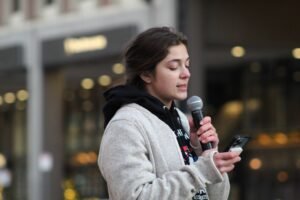
Many of the rally’s speakers called for the urgent needs of Artsakh Armenians forcibly displaced by Azerbaijan. Knar Krafian speaking on behalf of the Northeastern Armenian Student Association noted that she and her peers “are lucky enough to continue our education and carry on with our lives,” while “most Artsakhsis our age are focusing on survival.” Gulesserian on Zoravik’s behalf asserted: “With sanctions against the Aliyev clan and no more aid for Azerbaijan, Armenians might have a future. But the Armenians of Artsakh who fled Azerbaijani persecution need help now. The elderly sleeping in the streets and the malnourished children need immediate humanitarian assistance, and the paltry 11.5 million that USAID just promised to send to help ease the plight of Armenians is not enough. We demand that our congressional representatives do more: Send more humanitarian assistance to Armenia NOW! If we could give hundreds of millions of dollars in military aid to Azerbaijan to help cause this catastrophe, the least we can do is send adequate aid to save the lives of those directly victimized by it.”
Speakers with personal connections to the region noted that democracy in Armenia and Artsakh must be protected. Nairi Krafian’s speech on behalf of the Armenian Youth Federation was delivered by Knar Krafian, who described how visits to the Caucasus showed her that “Artsakh was a beacon of hope for all oppressed peoples, and a shining example of the good that could come from decolonization and democratic values,” but how “the beacon of light that was Artsakh was overcome by the darkness of Azerbaijani oppression and colonialism.” Judith Saryan, representing Democracy Today, echoed the sentiment: “America and the West did nothing to help the fledgling democratic Republic of Artsakh during the nine-month blockade by Azerbaijan and Russia which starved the people and led to their inability to protect themselves against the Azerbaijani attack.” Documentary photographer Winslow Martin noted: “Armenia cannot alone insure peace and stability in the region. Today, the border of the Republic itself is not safe. The free, independent democratic nation continues to be threatened with military incursion by its autocratic neighbor. No nation born in and committed to freedom and justice in the world should let this stand. To ignore such crimes is to embolden this and other potential perpetrators of such crimes around the world.”
Speakers noted the strength of aligning with other oppressed peoples. Emra Altindis on behalf of Bostonbul, a Boston-based Turkish organization, asserted: “Just in the last month, all these companies who are sending weapons to the world, specifically to Israel, made 27 billion dollar profits just in the last month. And these American companies are directly collaborating with the Israeli military complex, which supported the Azerbaijan regime during these attacks on Karabakh. And I think we need to see this connection between the suffering of the people in Palestine and the suffering of the people in Karabakh right now. They are so connected. And I hope this ethnic cleansing will stop in Karabakh, and in Gaza, as soon as possible. And I hope these oppressor regimes in Azerbaijan, in Turkey, in Israel, that they will lose, and we will find ways to live in peace and harmony.” Ihsan Karahasi, an activist with Zoravik, spoke in Western Armenian about the shared struggles of Kurds and Armenians against Turkish violence. Aïcha Belabbes, an activist with the Muslim Justice League, spoke about the shared histories of indigenous Palestinians and Armenians victimized by oppressive, genocidal, well-equipped regimes.
Several speakers urged the community to take a more active role in advocating for Armenia and Artsakh. Referencing Azerbaijan’s campaign to destroy Armenian cultural heritage in Artsakh, Tamar Melkonian, speaking on behalf of Amaras Art Alliance, explained: “We, who proudly bear the name Amaras [an Armenian monastery in Artsakh built in the 4th century where the inventor of the Armenian alphabet, Mesrob Mashdots, founded the first educational center for teaching it; the monastery is currently located in territory controlled by Azerbaijan], now have a heavier duty, to always remember this name and elevate its history and importance.” She urged the community to work in concert to prevent more cultural heritage destruction: “Together we stand to strengthen our resolve and to preserve that rich cultural heritage and ensure it thrives and prospers for generations to come.”
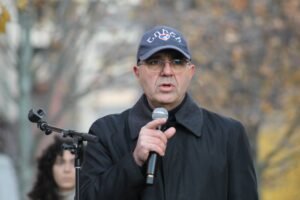
Herman Purutian of the Armenian Assembly of America – New England encouraged the community to keep working: “Our job is to make sure that we hold our government accountable in all ways. Last week the Senate passed the [“Armenian Protection Act of 2023”], which would take away the ability of the President to waive Section 907. It is a good start, but it is not done yet. It has to go through the House, and this is where we come in holding our government accountable. Each of you, I ask, that you reach out to your representatives. You can use the Armenian Assembly resources, you can use the Armenian National Committee’s resources. Reach out to your representatives and make sure that they ensure the passage of the resolution through the House and that bill goes to the President’s desk.”
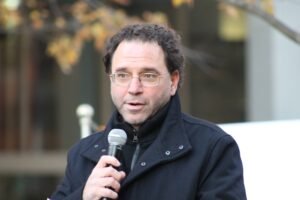
Aram Kaligian, who spoke on behalf of the Armenian National Committee – Eastern Massachusetts, asserted: “It is important to get out in the streets and show our congressmen, our leaders, our senators that what happens in Armenia matters to us and that is important to us. When 100,000 Armenians are starved and terrorized and driven out of their homes, and we don’t hit the streets, it says to our congressmen that it is not that important to us.” Kaligian went on to urge the attendees to take concrete action for Artsakh: “In terms of leveraging political support, the easiest thing you can do right now is to go to the ANCA website and sign up to be a rapid responder. So, whenever ANCA sends an email to President Biden, or the Congress, or Secretary Blinken demanding sanctions on Azerbaijan, or cutting military aid, an email gets sent in your name to your Congress[person] or Senator.”
The speakers at the rally were joined in spirit by Massachusetts Senators Edward Markey and Elizabeth Warren—both of whom have offices in the JFK Federal Building—who submitted statements of solidarity to be read at the rally in their absence.
Senator Ed Markey wrote:
“I want to extend my sincere gratitude to all of you for being here today, and for your continued advocacy on behalf of your Armenian family and friends who are being impacted by the ongoing displacement and dire humanitarian crisis in Nagorno-Karabakh. I want to take this opportunity to reassure you that my awareness and concern for you has remained steadfast.
On September 26, I signed a bipartisan, bicameral letter to the Department of State and the Department of Treasury calling on Secretaries Blinken and Yellen to impose sanctions on individuals in the Government of Azerbaijan associated with the military attacks against and brutal blockade of Nagorno-Karabakh.
And on September 21, I signed the “Supporting Armenians against Azerbaijani Aggression Act,” along with six other senators, to protect and provide humanitarian assistance to Armenians impacted by the genocidal actions taken by the Government of Azerbaijan. I once again wish to express my sincere thanks for your relentless advocacy.
I will continue to stand shoulder-to-shoulder with you all to lay bare truth and to push for understanding, sustained peace, and prosperity in [the region].”
Senator Elizabeth Warren wrote:
“Although I regretfully cannot be with you in person today, I strongly share your concerns about Azerbaijan’s recent attack in Nagorno-Karabakh, the need to protect Armenia and Armenians, and the worsening humanitarian crisis.
In September I joined my colleagues to call upon the State Department and Treasury Department to impose sanctions on those in the Azerbaijani government responsible for the attacks and blockade against Nagorno-Karabakh. I have also requested to be added to Senator Padilla’s resolution condemning Azerbaijan’s blockade of the Lachin Corridor and human rights violations by Azerbaijani officials against Armenian civilians. My office has been regularly in touch with the State Department to express these concerns.
I stand with the Armenian community during this extremely concerning time. We must hold accountable Azerbaijani officials responsible for this attack, blockade, and human rights violations. I will continue to press the Biden Administration to stand up for the Armenian people, including providing humanitarian aid, and to prevent the humanitarian crisis from escalating even further.
Thank you for your advocacy on such an extremely pressing issue, and I look forward to our continued efforts to protect the Armenian people.”
The rally was organized by the Zoravik Activist Collective and co-sponsored by a coalition of Boston-area youth, activist and advocacy groups, including the Pan-Armenian Council of New England, the Armenian Assembly of America – Massachusetts, the Armenian National Committee of Eastern Massachusetts and the Armenian Youth Federation – Greater Boston “Nejdeh” chapter.


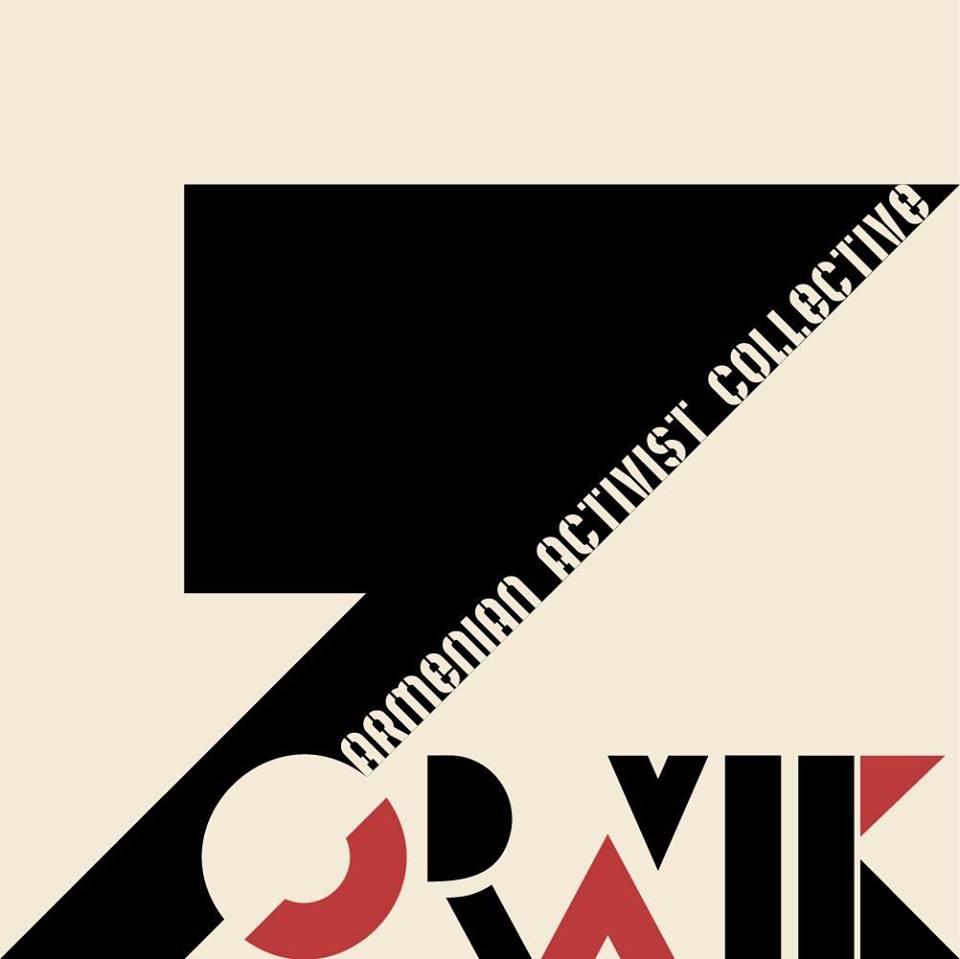
Be the first to comment